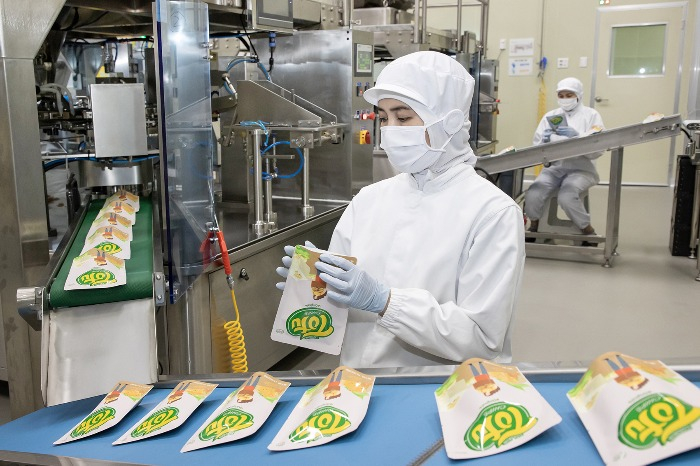Korean SMEs
Samsung Electronics' smart factory project targets SMEs
Its Smart Factory 3.0 plan will assist 600 smaller companies through investment of $22.7 mn over three years
By May 25, 2023 (Gmt+09:00)
2
Min read
Most Read
LG Chem to sell water filter business to Glenwood PE for $692 million


KT&G eyes overseas M&A after rejecting activist fund's offer


Mirae Asset to be named Korea Post’s core real estate fund operator


StockX in merger talks with Naver’s online reseller Kream


Meritz backs half of ex-manager’s $210 mn hedge fund



Sales of Cookia, a small maker of tofu snacks in South Korea based in Yeosu, South Jeolla Province, have jumped eight-fold in six years from 300 million won ($227,000) in 2016 to 2.4 billion won last year.
The company over the same period raised its number of employees from 10 to 25 and completed last year construction of a plant twice as big as its first.
The secret behind Cookia's success is Samsung Electronics Co.' corporate social responsibility project of helping small and medium enterprises (SMEs) build smart factories.
Before adopting the smart factory system, Cookia lost an average of 150 million won per year due to equipment failure that resulted in defective items. With support from Samsung Electronics, the SME created a system to make snacks at optimal temperatures by collecting on-site data in real time.
Samsung Electronics on Wednesday announced further development of its smart factory unit through the launch of Smart Factory 3.0 next month. This will help SMEs with Samsung Electronics-assisted smart factories like Cookia upgrade their plants using artificial intelligence (AI) and data technology.
The plan is to invest 30 billion won over three years at 10 billion won per year to support 600 SMEs.
Smart Factory 3.0 will target more sophisticated smart factories, specifically those of companies with basic data-driven automation systems. Plants will be streamlined to the level of "intelligent factories" that predict and resolve on-site problems by collecting and analyzing production data in real time with AI technology.
Since balanced regional development is one of the project's top goals, Samsung Electronics will prioritize SMEs in areas at risk of demographic extinction. The intent is to boost job opportunities for regional talent to ultimately help develop targeted regions.
A self-sustaining smart factory ecosystem is also planned in the provinces thanks to local governments and corporate beneficiaries nationwide joining the project.
The government of North Jeolla Province will partially subsidize the costs companies applying for the project must pay this year in the province as an incentive to stimulate construction of smart factories. Next year, a North Jeolla-type smart factory project will be launched separately from the one run by Samsung Electronics.
The Ministry of SMEs and Startups will offer subsidies matching what Samsung Electronics has contributed to support SMEs.
Marking its ninth year this year, Samsung Electronics' smart factory project was launched in 2015 under Samsung Group leader Lee Jay-yong's philosophy of sharing and growing together as the way to become the world's best. Through last year, the venture helped around 3,000 SMEs build smart factories with the company's support.
Write to Ye-Rin Choi at rambutan@hankyung.com
More to Read
-
 Artificial intelligenceLS Electric, Microsoft to jointly develop smart factory
Artificial intelligenceLS Electric, Microsoft to jointly develop smart factoryApr 20, 2023 (Gmt+09:00)
1 Min read -
 BatteriesLG Energy, SK On to raise yields with smart factory solutions
BatteriesLG Energy, SK On to raise yields with smart factory solutionsMay 25, 2022 (Gmt+09:00)
2 Min read -
 ElectronicsLG Electronics turns home appliance plant into smart factory
ElectronicsLG Electronics turns home appliance plant into smart factorySep 16, 2021 (Gmt+09:00)
2 Min read -
 Electric vehiclesHyundai innovates EV manufacturing with smart factory system
Electric vehiclesHyundai innovates EV manufacturing with smart factory systemJul 02, 2021 (Gmt+09:00)
1 Min read
Comment 0
LOG IN


